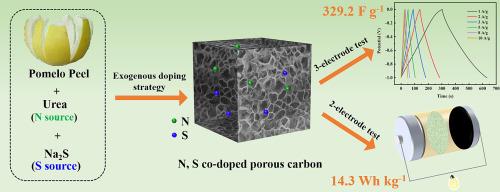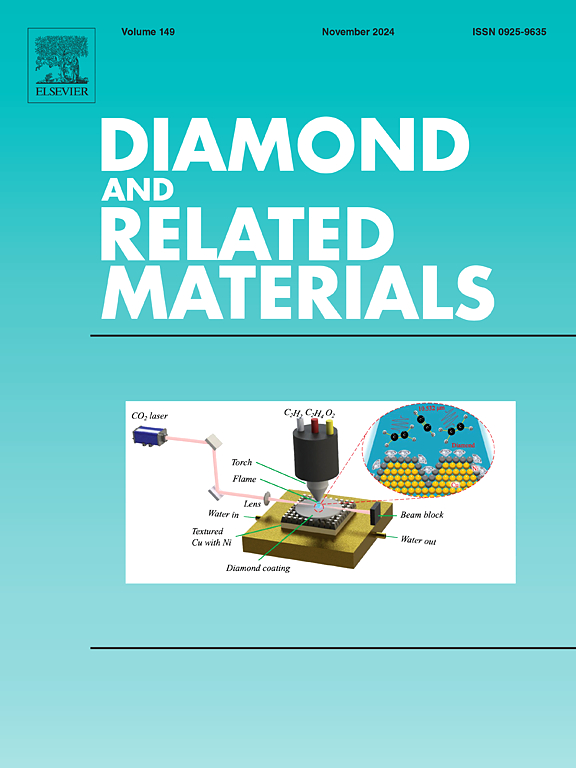通过有效的外源掺杂策略从柚子皮中提取蜂窝状 N、S 双掺杂多孔碳,用于超级电容器电极
IF 4.3
3区 材料科学
Q2 MATERIALS SCIENCE, COATINGS & FILMS
引用次数: 0
摘要
生物质因其低成本和丰富的资源而成为合成超级电容器电极材料的重要前体。优化杂原子和多孔结构被认为是提高生物质生成碳的电化学性能的可行方法。本文以柚子皮为前驱体,使用 KOH 作为活化剂和杂原子掺杂剂(尿素和硫化钠),在高温条件下成功转化为 N、S 双掺杂多孔碳。有效的外源掺杂策略实现了 N/S 杂原子的高丰度,而 KOH 化学活化则促进了纳米孔和互连孔隙的发展。制备出的 CNS-800 碳具有 1823.8 m2 g-1 的高比表面积和丰富的 N(2.51 wt%)和 S(1.36 wt%)杂原子,可望表现出优异的电化学性能,包括在三电极(3E)系统中 1 A g-1 时 329.2 F g-1 的优异比电容和 74.12 % 的超高电容保持率。基于 CNS-800 制造的对称双电极(2E)超级电容器具有 243.7 F g-1 的良好电容和出色的循环稳定性,以及 14.3 Wh kg-1 的超高能量密度。这项研究为将柚子皮等生物质废弃物转化为高性能超级电容器电极提供了一种极具吸引力和成本效益的方法。本文章由计算机程序翻译,如有差异,请以英文原文为准。

Honeycomb-like N, S dual-doped porous carbons derived from pomelo peel by effective exogenous doping strategy for supercapacitor electrodes
Biomass has emerged as a pivotal precursor to synthesize supercapacitor electrode materials owing to its low-cost and plentiful resources. The optimization of heteroatoms and porous structures is believed to be a viable method to enhance the electrochemical properties of biomass-generated carbons. Herein, pomelo peel as a precursor using KOH as an activator and heteroatom dopants (urea and sodium sulfide) was successfully converted into N, S dual-doped porous carbons under the high temperature. The effective exogenous doping strategy realizes a high abundance of N/S heteroatoms, and KOH chemical activation promotes the development of nanopores and interconnected porosities. The resultant carbon CNS-800 with a high specific surface area of 1823.8 m2 g−1 and rich heteroatoms of N (2.51 wt%) and S (1.36 wt%) anticipately exhibits the outstanding electrochemical properties, including the excellent specific capacitance of 329.2 F g−1 at 1 A g−1 in a three-electrode (3E) system and the superb capacitance retention rate of 74.12 %. The fabricated CNS-800-based symmetric two-electrode (2E) supercapacitor demonstrates a good capacitance of 243.7 F g−1 and excellent cycling stability, as well as a superb energy density of 14.3 Wh kg−1. This work provides a compelling and cost-effective approach to transform biomass waste like pomelo peels into high-performance electrodes for supercapacitors.
求助全文
通过发布文献求助,成功后即可免费获取论文全文。
去求助
来源期刊

Diamond and Related Materials
工程技术-材料科学:综合
CiteScore
6.00
自引率
14.60%
发文量
702
审稿时长
2.1 months
期刊介绍:
DRM is a leading international journal that publishes new fundamental and applied research on all forms of diamond, the integration of diamond with other advanced materials and development of technologies exploiting diamond. The synthesis, characterization and processing of single crystal diamond, polycrystalline films, nanodiamond powders and heterostructures with other advanced materials are encouraged topics for technical and review articles. In addition to diamond, the journal publishes manuscripts on the synthesis, characterization and application of other related materials including diamond-like carbons, carbon nanotubes, graphene, and boron and carbon nitrides. Articles are sought on the chemical functionalization of diamond and related materials as well as their use in electrochemistry, energy storage and conversion, chemical and biological sensing, imaging, thermal management, photonic and quantum applications, electron emission and electronic devices.
The International Conference on Diamond and Carbon Materials has evolved into the largest and most well attended forum in the field of diamond, providing a forum to showcase the latest results in the science and technology of diamond and other carbon materials such as carbon nanotubes, graphene, and diamond-like carbon. Run annually in association with Diamond and Related Materials the conference provides junior and established researchers the opportunity to exchange the latest results ranging from fundamental physical and chemical concepts to applied research focusing on the next generation carbon-based devices.
 求助内容:
求助内容: 应助结果提醒方式:
应助结果提醒方式:


